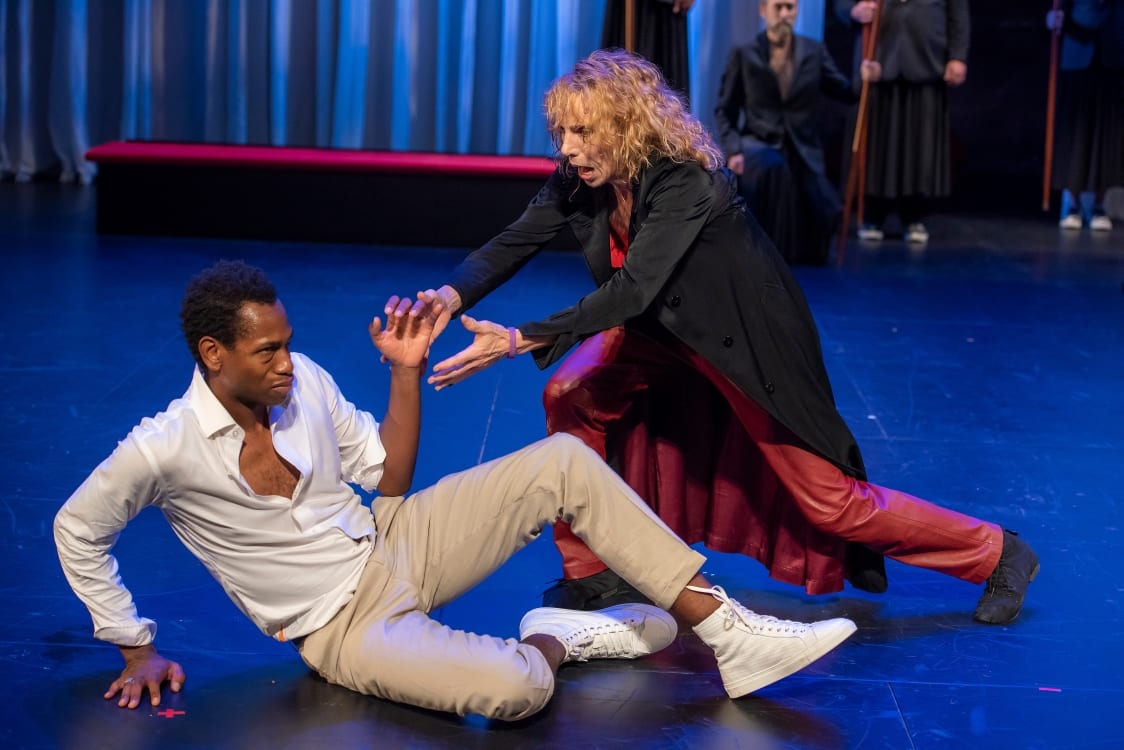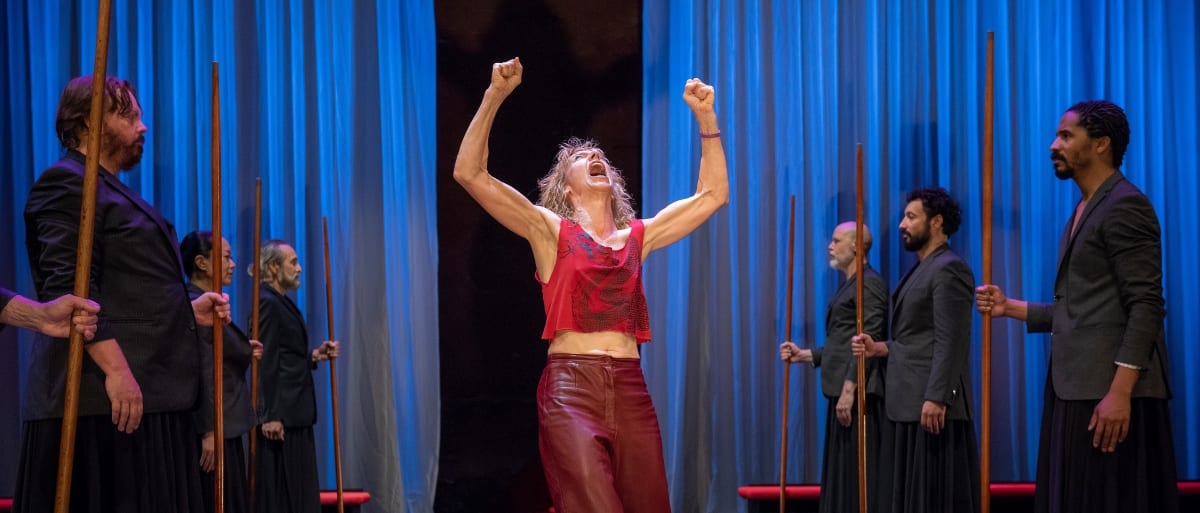You know that it’s going to be good from the minute the spooky, soulful original track of “I Put a Spell on You” strikes up. The Greek chorus marches methodically into place, awaiting the arrival of their god. Before long Dionysus appears in all his glory, with flowing blonde curls and overflowing bottles of wine. It’s the perfect way to set the scene for the 100 ensuing minutes of the deliciously weird, sometimes sexy, sometimes chilling production that is Anne Bogart’s The Bacchae.
Euripides’ The Bacchae, sometimes considered one of the greatest tragedies ever written, is something of an origin story, set in the Greek city of Thebes. Our protagonist (or anti-hero, depending on your sympathies) is Dionysus, the god of wine. Like many ancient Greek myths and stories, Dionysus is here to wreak havoc on mortals – but this havoc is quite personal. Dionysus is a fairly new god, the son of a mortal princess of Thebes. His mother died before her baby was born, leaving his father Zeus to carry Dionysus to term inside his thigh. If you think that’s strange, The Bacchae is just getting started – and Anne Bogart’s production is just as weird and bloody as you could possibly hope for.
Dionysus, finding that his mortal mother’s very mortal family are rejecting his divinity, descends upon Thebes to prove his legitimacy as an Olympian. But though he has hordes of Thebans and Bacchantes following him in cultish devotion, his own cousin Pentheus, the king of Thebes, is an unbeliever. Pentheus is determined to stamp out any Bacchanal worship as heresy. And so Dionysus tears the ruling family of Thebes apart, from his grandfather Cadmus – the founder of the city – to his late mother’s sisters, and of course his stubborn cousin the king.
The cast proves over and over their infinite talent. The members who make up the Chorus have mastered the balance between creepy and captivating in their worship of the god. Scene after scene they dance, march, sing, or balance wine jugs and wine boxes on their heads. They dazzle the audience and keep us in anticipation of what they’ll do next. But the unquestionable star of the show is Ellen Lauren as Dionysus. She is at once endearing and terrifying, dancing across the stage with the comportment (and aesthetic) of a manic Mick Jagger. Lauren plays Dionysus as impossibly powerful, and drunk with the powers of his own godhood.

The Actors:
CAST
Dionysus -Ellen Lauren*
Tiresias -Barney OÕHanlon*
Cadmus -Stephen Duff Webber*
Pentheus- Eric Berryman*
Soldier- J. Ed Araiza*
First Messenger- Leon Ingulsrud*
Second Messenger -Gian-Murray Gianino*
Agave- Akiko Aizawa*
Chorus -Roshni Shukla* & Samuel Stricklen*
Photo Credit: Stephanie Berger.
The elements of this play fall in place to create an experience that will keep you on your toes. Pentheus, King of Thebes (Eric Berryman), is introduced with a few jarring bars of Kanye West’s “I Am a God” – a choice whose irony is not lost when later, Dionysus’s vengefulness having overwhelmed his playfulness, the angry and power-drunk Bacchus screams those very words at his defeated mortal family.
One of the most interesting choices of the production was to have Agave (Akiko Aizawa), the mother and eventual murderer of Pentheus, speaking her lines in her native Japanese. According to the director’s note, “using [Aizawa’s] first language allows her to feel and express Agave’s core emotions of grief and understanding as deeply as possible.” The effect is certainly felt. Though I personally could not understand her words, her performance was the most spellbinding of the entire production, and no less heart-wrenching for the language barrier.
As there ever is with plays that have endured two and a half thousand years of human history, there is something utterly familiar – and terrifying – about this production of The Bacchae. Under the direction of Bogart, a distinctly 21st-century narrative unfolds with Greek bloodiness: an unhinged minor god, hellbent on carrying out a petty vendetta, destroys without mercy his very obviously defenseless, if not ignorant, subjects. Is it a warning about displeasing the gods, or a warning about tyrants and the misuse of power?

